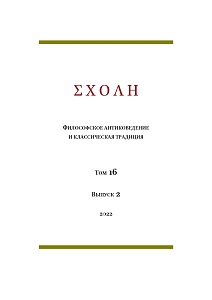Socrates’ humour and Plato’s games in the commentaries of late Neoplatonists
Socrates’ humour and Plato’s games in the commentaries of late Neoplatonists
Author(s): Dmitry Kurdybaylo, Inga KurdybayloSubject(s): Metaphysics, Ancient Philosphy, Philosophy of Religion, Ontology
Published by: Новосибирский государственный университет
Keywords: Plato; Parmenides; game; Socrates; irony; Proclus Lycaeus; Damascius; Simplicius; Olympiodorus the Younger;
Summary/Abstract: The irony of Socrates is one of the essential elements of Plato’s dialogues. However, what appears ironic or playful to modern readers, was not apprehended in the same way by Neoplatonic commentators. For Proclus, one of problematic Plato’s passages concerns the “laborious game,” which refers to the refined eight hypotheses of the Parmenides. Proclus turns to various places of Plato’s dialogues where different games are mentioned. Some of them are mimetic arts, which are partly restricted in Plato’s Republic. Other games are distinguished as pertaining to “old men” and to children: the former is appropriate to philosophers, while the latter is not. Even the “laborious” mode of Parmenides’ playing is given an ontological interpretation. Damascius was aware of the “Parmenides’ game” problem, but he primarily used ready Proclean interpretation. Unsurprisingly, Damascius approaches the conclusion that Parmenides was not playing at all — despite the apparent wording of Plato and minute investigations of Proclus. The extant writings of Simplicius contain no dedicated Platonic commentaries. However, the commentary on Epictetus’ Enchiridion contains a verbose argument on human laughter and its role in a philosopher’s ethos. In general, Simplicius continues Damascius’ trend of rigorous seriousness. Olympiodorus the Younger follows his predecessors in a mere serious reading of Plato, but he acknowledges numerous instances of Socrates’ irony and joking. However, Olympiodorus dissociates Plato from Socrates’ irony and emphasises its purely didactic extent. Generally, we can conclude that the later a Neoplatonic commentator is, the less perceptive to Plato’s humour he appears.
Journal: ΣΧΟΛΗ. Философское антиковедение и классическая традиция
- Issue Year: XVI/2022
- Issue No: 2
- Page Range: 493-505
- Page Count: 13
- Language: English

